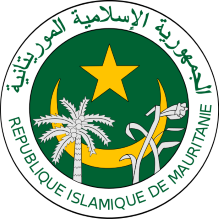Mauritania: Government
Key Figures
- Chief of State:
- President Mohamed Ould Cheikh el Ghazouani
- Head of Government:
- Prime Minister Mohamed Ould Bilal
Overview
- Government Name:
- Islamic Republic of Mauritania
- Constitution:
- Adopted: 1991; Outlines fundamental principles for the citizens of Mauritania, the structure of the government in regards to its three branches, treaties and international accords, and territorial districts.
- Government Type:
- Military Junta

Index of Economic Freedom
Country Risk Rating
Government Branches
| Main Powers | Election Process | Election Cycle 1 | |
|---|---|---|---|
| Executive | President is responsible for guarding the constitution, representing the State, and guarantees national independence and territorial integrity. President also has the power to dismiss and appoint judges despite independence of judiciary. Prime Minister is responsible to the National Assembly for the role of his various ministries as the government |
President is elected by absolute majority vote through a two-round system. Prime Minister is appointed by the president. |
5 years |
| Judicial | Supreme Court is the most supreme amongst Mauritania courts. The Constitutional Council oversees the regularity of elections, considers applications, and rules on the constitutionality of laws. |
Supreme Court judges appointed by the president of the republic, while Constitutional Council members are appointed by the president of the republic, the president of the National Assembly, and by the president of the Senate. |
Supreme Court President: 5 years Constitutional Council members: 9 years |
| Legislative | The parliament functions as a bicameral legislative body with the Majilis al-Shuyukh (Senate) as the higher house and Jamiya Al Wataniya as the lower house. |
The Majlis al-Shuyukh have 53 members elected by indirect vote and 3 members reserved for the diaspora community. Al Jamiya Al Wataniya has 81 members elected in single and multi-member constituencies and 14 members elected through a closed-list proportional representation system. |
Majlis al-Shuyukh: 6 years; Al Jamiya Al Wataniya: 5 years |
Regional Trade Blocs
International Organization Participation [2]
Environmental Agreements [3]
Tax Information [2]
- Tax Authority:
- Information not available
- Tax Name:
- Information not available
Sources:
- ElectionGuide http://www.electionguide.org/
- EY, http://www.ey.com
- CIA World Factbook, https://www.cia.gov/the-world-factbook/
- U.S. Bilateral Relations Fact Sheets http://www.state.gov/r/pa/ei/bgn/


